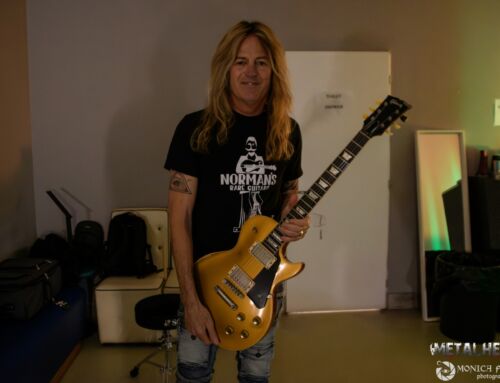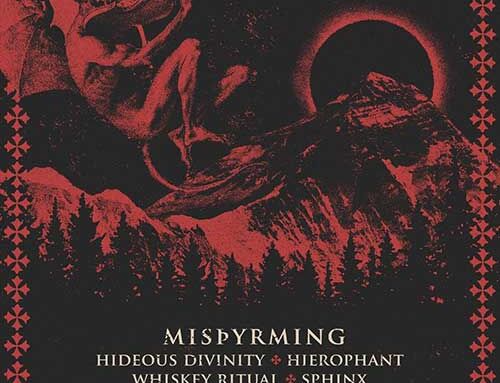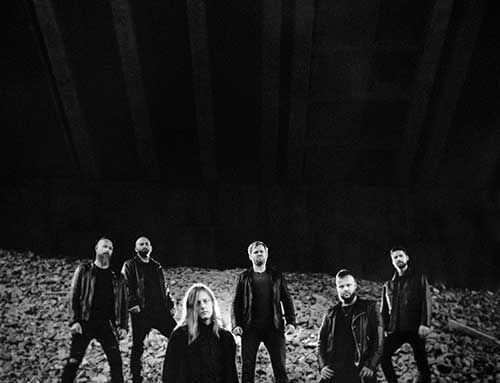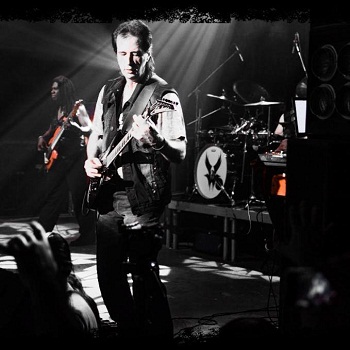 In this long and epic interview, MetalHead talks with the great William J. Tsamis about the new Warlord’s album “The holy Empire”. But there is also room to discuss about Christian metal, the band’s texts and the universal meaning of war, in a dialogue that slowly becomes a sort of introduction to William and his art. Enjoy your reading! (versione italiana)
In this long and epic interview, MetalHead talks with the great William J. Tsamis about the new Warlord’s album “The holy Empire”. But there is also room to discuss about Christian metal, the band’s texts and the universal meaning of war, in a dialogue that slowly becomes a sort of introduction to William and his art. Enjoy your reading! (versione italiana)
Hello William, and thank you so much for this interview and for your time. Are you satisfied with “The holy Empire” and with the feedbacks the album received?
Hello and thank you as well Renato, nice to be here. I will answer your first question by saying ‘yes’ on both counts. We did set out to create a “different” sort of an album, to ‘break the mold’ so to speak and this was accomplished compositionally as well as by means of production values. The fans’ response was phenomenal leading to now the fourth repressing of the album in CD form, requests from Japan for a Japanese version (that should be available by the end of November), a sold-out vinyl edition and even a sold-out cassette. Critical reception has also been extremely positive; the album has received very high marks everywhere, be it in print or online and we couldn’t be happier.
Why Rick Anderson is no more a member of the band? I find his performance in “Empire” really superlative…
I will agree with your opinion on Rick’s performance on “The Holy Empire”. I will even go further and say that the album couldn’t have been sung in this form by anyone else. Rick did an absolutely fantastic job, even contributing great ideas to harmony structures (which I incorporated to the final product) and I was overall very happy with his performance (as were the fans in the end, despite initial questions). However, as you know there’s one song in the album (“Kill Zone”) that did not feature Rick but Giles Lavery (who also helped us during our 2013 European Mini Tour). That’s because Rick’s voice wasn’t suitable for that song. The human voice unlike other instruments has a set timbre, a tone – a ‘sound’ if you will – that cannot be changed. So it either fits a music or it doesn’t. The music that I am composing now therefore inevitably led me to the change of vocalists. It needs a voice with a higher register and more power, closer to the vocal sound in “Deliver Us”. Nicholas has just ‘that’ type of voice and obviously the change was a ‘no-brainer’. The music took us there; and we should follow the music.
I think that the lyrics of “Empire” are more explicitly Christian-oriented than before. Is this an intentional choice? Would you define Warlord in 2013 as a Christian metal band?
Let me repeat something that I said recently on a television interview; calling Warlord a ‘Christian metal’ or ‘White metal’ band would be too restrictive of a term. Expanding on this a bit, it’s obvious that as the composer and lyricist, my well publicized personal beliefs affect and are present in everything I write and compose. The imagery that I create through the music and lyrics may contain glimpses of archetypes present in my personal belief system and to some people may even be recognizable as such. However, the questions that I pose and the subjects that I touch, are decidedly universal; in general as human beings we share many questions and many goals. I try to present these ideas in a form that can touch people artistically and personally, transcending belief barriers. Additionally, not every song in the album could be characterized as ‘faith-based’. So to re-iterate, no; Warlord is not a Christian Metal band. We try to serve the art wherever this takes us.
Anyway, in Warlord’s and especially in Lordian Guard’s lyrics, the Bible is a constant source of inspiration, and sometimes you incorporate verses of (or clear allusions at) the Holy Scripture in your own texts. This is a method of composing that’s incredibly similar to the process of writing in the philosophy and theology of Middle Ages that I study! Are you aware of that? I find this correspondence really fascinating…
As I discussed prior, in Warlord’s case that wasn’t intentional but rather a by-product of the subject matter. The Bible indeed is recognized the world over, as a work that addresses universal questions and that’s where many of the questions we have as humans are answered. Lordian Guard however was a ‘Christian Apocalyptic Mediaeval/Renaissance metal’ project that specifically approached the music through both the theology and Christian philosophy and it did so in both musical style and writing. As a result of this, it does have clear references to Biblical Texts and scholars, but it doesn’t stop there; I’ve used sources such as Milton to draw inspiration and create the proper ambiance for that kind of musical imagery. I’ve used quotes albeit usually modified slightly in both Warlord and Lordian Guard pieces and I always enjoy using multiple entendres in songs that I write. They serve mainly to address different fans with different personal questions on a different, more personal, level as well as to enclose meanings within meanings.
In this context, I’ve always thought of “Deliver us” as a sort of ‘modern prayer in music’… would you agree with this interpretation?
That’s a very interesting and original perspective! I suppose one could draw parallels, if we accept that a prayer is a request to a higher power for good to triumph over evil, generally speaking. You have to remember, that at the time that I wrote the songs in “Deliver Us” and specifically “Deliver Us From Evil” (which I believe you are referring to), neither my faith had developed in its present form, nor I was yet decided on what philosophical path I should follow in my life. That came later; although the questions and subjects that I dealt with at the time, do not differ from any other person’s then or now. I do not therefore dismiss your interpretation, nor disagree with it as looking back now I had already chosen a path that led me to where I stand now. It wasn’t however intended to function in the way you assert when it was written although subconsciously it may very well have been.
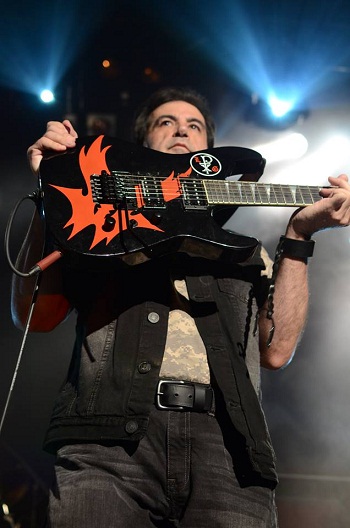 In “Kill Zone” and “Night of the Fury” you discuss other themes, yet with a visionary and almost mystic approach. What do you think about the recent USA wars in the Middle Orient and the tragic events of 11.09.2001?
In “Kill Zone” and “Night of the Fury” you discuss other themes, yet with a visionary and almost mystic approach. What do you think about the recent USA wars in the Middle Orient and the tragic events of 11.09.2001?
“Kill Zone” and “Night Of The Fury”, but especially the former are great example as to why Warlord shouldn’t be characterized as a Christian Metal band. Their imagery is savage and hurtful; as art they are meant to provoke and evoke the feelings they do. Both songs illustrate very well pain and suffering, hatred and the ills of war. Many fans were actually taken aback when they first listened to these songs and it took some time until the understood the full context. It’s the modern context especially that greatly surprised them and a few more were perplexed regarding my stance. My personal belief can best be summarized in that ‘War is the sum of all evils’ and ‘War is cruelty’ to paraphrase and quote Stonewall Jackson and William Tecumseh Sherman. I recognize also that war is a fact of life and that it is ever-present throughout human history. These things are true for ANY war, not just the recent ones. As for 9/11, I can only offer the facts of it being a cruel, unjust and cowardly act of war. It was a profoundly painful moment (also symbolically) for my country that was totally unprepared for such an attack. If what you are asking is if the wars that ensued were justified and the outcome was the intended one, I would respond that’“the road to hell is paved with good intentions’. The war (certainly the Afghan war) was justified but as it always happens in a war, the outcome is almost never the desired one. It’s the nature of war that ensures that. And as it is common in every war, it’s the simple people that suffer in the end.
And what are exactly the ‘70.000 sorrows written across your face’? Is this song the story of YOUR redemption?
All the songs that I write, in some shape of form, contain autobiographical elements. In this case the song speaks about the ‘trials’ and ‘tribulations’ one (and I am no exception) has to go through to reach redemption. It is NOT the story of redemption. The book on this is still out. I would call it ‘the story of the ongoing trials’ in a person’s life. My trials are well known, so yes it speaks about them, but in a way that all people can relate. Everyone goes through pain and suffering in some shape or form throughout their lives and these leave marks both on one’s character and their outlook on life. These are all ‘written across your face’.
I would like to ask you something about my favourite Lordian Guard song too… “War in Heaven” is in my opinion one of the best epic metal songs of all time! Have we to read it as a metaphor or is it a ‘simply’ collection of images from the Revelation and other ancient texts?
“War In Heaven” (as also stated in the byline) is based loosely on John Milton’s “Paradise Lost”. This epic actually deals with events leading up and around the Original Sin and not the Revelation. In my adaptation I have left Adam and Eve totally outside the narrative as I wanted to concentrate in the battle of good vs. evil. This is subject matter that I revisit frequently; an early example is “Deliver Us From Evil” and recent ones is “70,000 Sorrows” and “Thy Kingdom Come” (although in these cases, the ‘battle’ is more subtle than the all-out depiction of it in “War In Heaven”). You are indeed correct, that this carries a metaphorical meaning; or rather that it works on multiple levels. Like most of my songs as I mentioned above it has multiple entendres that wait to be discovered. So it will work as a narrative on first listen, but also serves as a description of one’s ebbs and flows of life. Even deeper it’s a spiritual guide of sorts. Depends on how each listener likes to approach my songs and this one is no exception.
Can you easily reconcile your musical activities (especially the live concerts) with your academic duties? Is it easy for you to be a professor of theology and a heavy metal star?
Since I’ve gotten ill, I had to quit my academic career – it was one of the most difficult decisions I had to make as teaching was a very fulfilling experience for me. Now that I have gotten better (partly thanks to the music in a way) I am, once again, a full time musician so there is no conflict there. As for being a heavy metal ‘star’, well I don’t think that is true; I understand that many people view me this way and I am eternally grateful for their support, but I am nothing more than an regular person that strives to express himself through his art.
Now we expect to see Warlord in Italy! Have you already organized a future concert in my country?
Concerts are not organized by us unfortunately; promoters do that. We’d very much like to play in Italy, especially having an Italian member of the touring version of Warlord – my good friend and excellent guitarist Paolo Viani. We understand that Italian fans are very passionate as Mediterraneans usually are and that would be a great experience for us and the fans. If a promoter approaches us therefore with a viable proposal, we’d gladly accept it.
Can you already tell me something about the fifth Warlord album? When is it going to be released?
Well, I cannot reveal more at this point other than that I will again try to present something ‘new’ and ‘exciting’. Having Nicholas in the band, also greatly expands the ‘tools’ at my disposal as a composer; the album will be a bit heavier that much is certain. I think that the fans will be pleased. As for a date, that should come definitely within 2014. At this point, that’s all I can say.
Thank you very much for your time and availability. I hope you’d like to hail the Italian fans!
Thank you too! Our message to the Italian fans is one of gratitude; although “The Holy Empire” is not available in traditional outlets in Italy, Italian fans keep on getting it through our webstore at www.warlord-official.com/warmart/ and they do so in ever increasing numbers. We are thankful for their support always and we are looking forward to see them in person and bring Warlord to Italy!
(Renato de Filippis)

